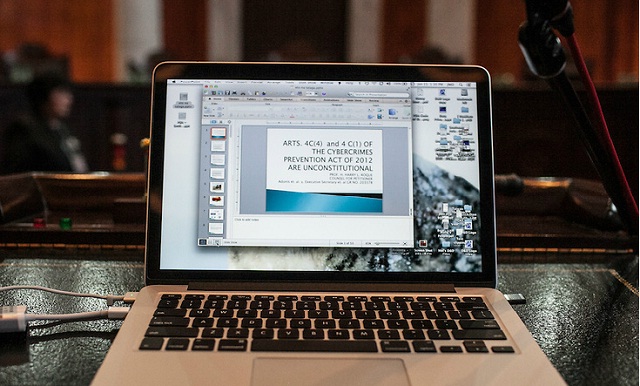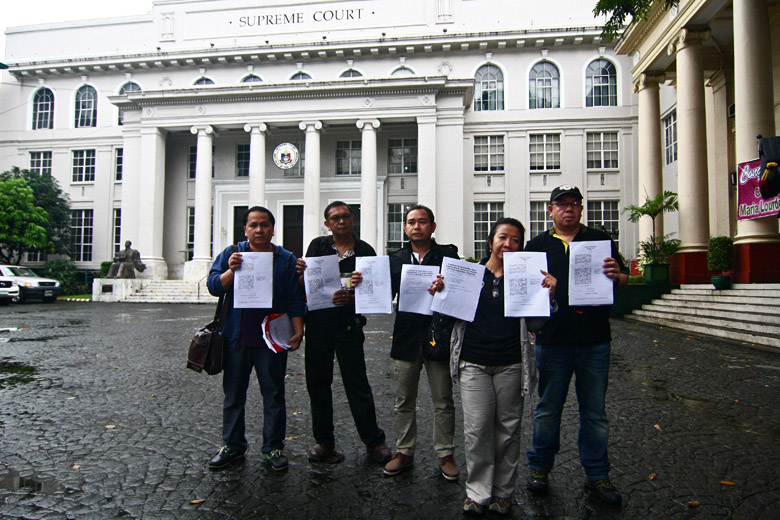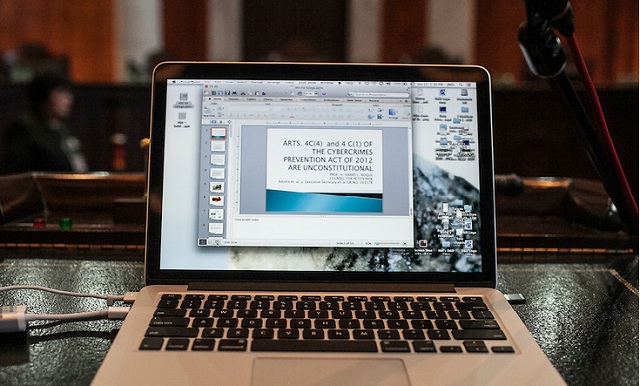
Text by MIKHA FLORES
Photos by MARIO IGNACIO IV
THE recently signed Cybercrime Law may be unconstitutional since it adopted the libel provision of the Revised Penal Code (RPC) which may no longer be in conformance with Supreme Court decisions and international law when the Philippine government signed and ratified the International Covenant on Civil and Political Rights (ICCPR), Supreme Court Associate Justice Antonio Carpio said Tuesday.
In his interpellation of Law Professor Harry Roque during the oral argument against Republic Act 10175 or the Cybercrime Prevention Act of 2012, Carpio observed that when the Philippines signed and ratified the International Covenant on Civil and Political Rights (ICCPR), “it repealed prior laws inconsistent with it.”
Article 19 of the ICCPR guarantees the right to freedom of expression. The right to free speech can be restricted for respect of the rights or reputations of others; and for the protection of national security, public order, or public health and morals.
As a signatory to the treaty, the Philippine laws must be consistent with international law provisions.
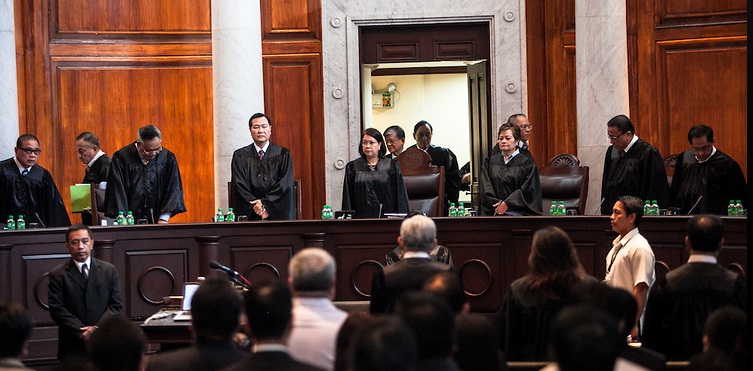 “We have recognized the jurisdiction and the competence of the Human Rights Committee to receive communications on behalf of our nationals alleging that the Philippine government is in breach of its state obligation under the ICCPR,” Roque said.
“We have recognized the jurisdiction and the competence of the Human Rights Committee to receive communications on behalf of our nationals alleging that the Philippine government is in breach of its state obligation under the ICCPR,” Roque said.
“There’s a possibility that it’s inconsistent with Article 354 of the Revised Penal Code,” Carpio said, referring to the ICCPR.
[box style=”2”]
[/box]
Article 354 of the RPC presumes malice to every libelous statement except in private communications and speeches delivered by public officers in the exercise of their functions.
The ICCPR provision was put to a test when Alex Adonis, a Davao-based broadcast journalist, filed a complaint before the United Nations Human Rights Commission (UNHRC) questioning the criminal nature of libel in the country. The UNHRC sided with Adonis and ruled that criminal libel is incompatible with freedom of expression.
“In the case of Adonis, the Human Rights Committee said that they violated Article 19 because the penalty was imprisonment,” Carpio said.
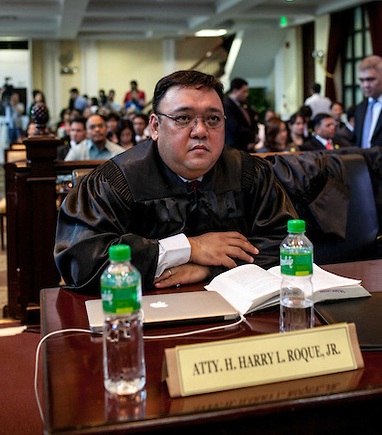 Carpio also took note of a US Supreme Court decision on freedom of expression that the Philippines adopted in subsequent Supreme Court decisions. “Is Article 354 still constitutional under the jurisprudence of this court since the time we adopted New York Times v. Sullivan?” he asked Roque.
Carpio also took note of a US Supreme Court decision on freedom of expression that the Philippines adopted in subsequent Supreme Court decisions. “Is Article 354 still constitutional under the jurisprudence of this court since the time we adopted New York Times v. Sullivan?” he asked Roque.
“That section of the RPC is also unconstitutional now since the time we adopted freedom of expression,” Roque replied.
The Cybercrime law adopted the RPC provisions in punishing libelous statements made through a computer system.
Carpio further asked: “Let’s assume now that Article 354 is unconstitutional. What is the effect of that with respect to the cybercrime law because cybercrime law adopts the definition of libel under the Revised Penal code?”
“That would mean [the provision on libel is ] unconstitutional, your honor,” Roque replied.
Five lawyers took turns in arguing against the Cybercrime Prevention Law. Roque argued the provision which punishes libel when committed using a computer system. Roque was also assigned to discuss the cybersex provision in the law.
Bayan Muna Representative Neri Colmenares presented the case against the provision which punishes by one degree higher crimes covered by the Revised Penal Code or special laws if committed using information and communications technologies.
Rodel Cruz, a senior partner to CVC Villaraza Cruz Marcelo and Angangco, questioned the power given to the Department of Justice to restrict or block access to computer data that violates the Anti-Cybercrime Law.
Lawyer Jose Jesus Disini argued against allowing law enforcement authorites to collect traffic data in real time. Julius Matibag of the National Union of People’s Lawyers contended the provision which punishes internet users for conspiring in a cybercrime offense.
Sen. Teofisto Guingona described the Cybercrime Prevention Law as a “cyberdracula that must be put to sleep.”
Solicitor General Francis Jardeleza will lead the government in presenting the case for the Cybercrime Prevention Law on Jan. 22.
(Disclosure: VERA Files is one of the petitioners against the Cybercrime Prevention Act of 2012).
Oral arguments vs Cybercrime Law
